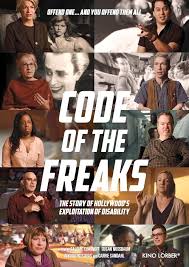
CODE OF THE FREAKS
US, 2020, 68 minutes, Colour.
Directed by Salome Chasnoff.
This is a documentary well worth seeing raising quite a number of questions. As the title indicates, it is a focus on the portrayals of, broadly speaking, disabled persons in feature films over the decades.
It takes its opening from the 1935 Todd Browning film, Freaks, with some lengthy clips from the film, making visual impact on the documentary’s audience. In fact, throughout the film, though brief running time, there is an abundance of clips from a wide variety of feature films, but especially from English-language films. Fortunately, the title of each film appears in the top left-hand corner so that audiences can identify the films, and identify whether they have seen the films or not.
Significantly, there are a number of experts speaking to camera. There is also a wide variety, more women than men commenting, many of the commentators disabled; especially strong is a dwarf woman who engages the audience to listen to her points of view, with touches of humour. There is also the British actor, Matt Fraser (who appeared in such series as The Sister Boniface Mysteries). There are quite a number of other commentators, especially film critics, strong points of view vigorously put forward.
Some of the issues raised for audience consideration include performances by actors as physically and mentally disabled, strong attention given to Daniel Day Lewis in My Left Foot, Dustin Hoffman in Rain Man, Eddie Redmayne as Stephen Hawkings. (And, at the end, there is a collage of Oscar awards to actors portraying the disabled, with extensive than we might have anticipated.)
One of the issues raised is the disabled, sexuality, visual portrayals, reticence, challenging the audiences to think of disabled and their humanity, even with limitations from their disabilities.
Also considered at some length is the issue of cure, hope for cure, and how realistic this is/ and not.
And another consideration is that of the inspiration afforded by the struggle of the disabled, the contribution by their carers and mentors, a focus on such films as The Miracle Worker and the story of Helen Keller.
Audiences will not agree with every statement put forward by the commentators which, as has been mentioned, they put forward with great vigour and intensity.
The film would have been highly enhanced had there been interviews with dwarf actor, Warwick Davis, and, most especially, an actor who has achieved extraordinarily over two decades in all kinds of roles, a discussion with Peter Dinklage.